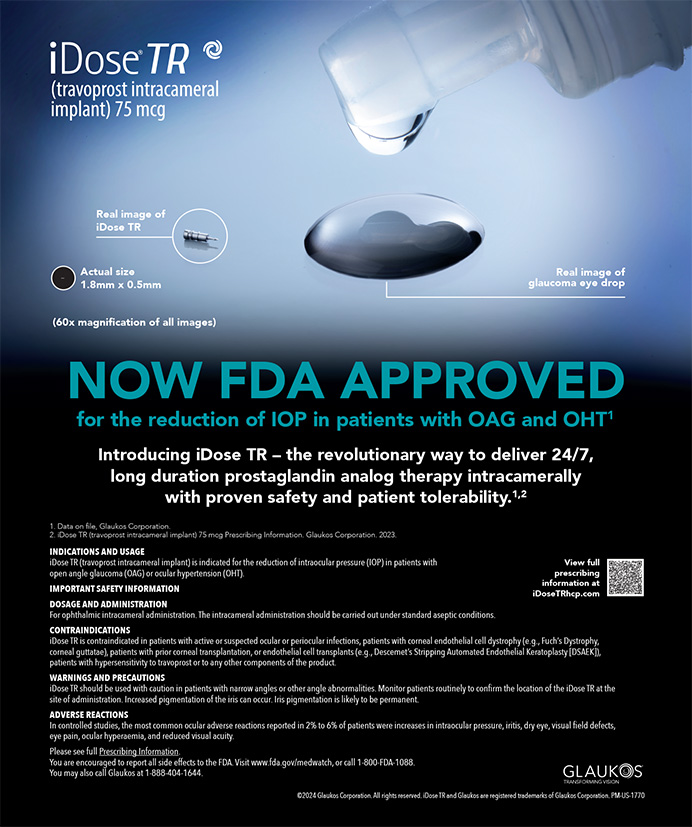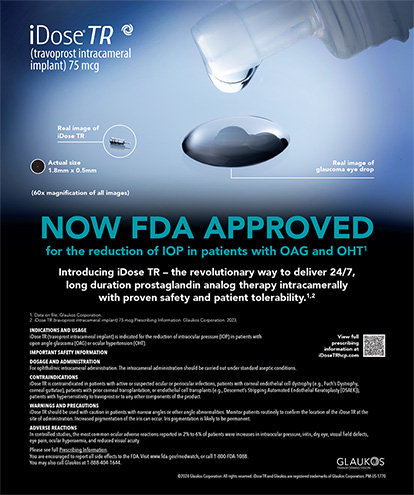Simplifying the postoperative medical regimen through less frequent dosing should improve patients’ adherence. As a step in this direction, between February and April 2011, we conducted a randomized, controlled trial at Matossian Eye Associates.
STUDY PROTOCOL
The purpose of the study was to assess the efficacy and safety of difluprednate ophthalmic emulsion 0.05% (Durezol; Alcon) dosed twice versus four times a day in conjunction with a nonsteroidal antiinflammatory drug (NSAID) to treat the inflammation and pain associated with cataract surgery. The patients (N = 30) were scheduled to undergo sequential, bilateral cataract surgery. Treatment consisted of a single drop of difluprednate administered to their first operated eye either twice or four times daily (groups 1 and 2, respectively), and therapy began on the day after surgery. Group 1 instilled difluprednate twice daily for 31 days and then once daily for another 4 weeks, at which point the drug was discontinued. Group 2 instilled difluprednate four times daily for 14 days, at which point they began administering the drug twice daily for an additional 2 weeks and then once daily for another 4 weeks before discontinuing treatment.
The contralateral eyes were then treated according to the opposite regimen, allowing patients to serve as their own controls. Study visits occurred on days 1, 7, and 30 to 40 postoperatively.
Among the exclusion criteria were the use of systemic steroids during the 2 weeks prior to enrollment, steroid injections during the 4 weeks before enrollment, or a depot corticosteroid during the 2 months before enrollment; an allergy to corticosteroids or similar drugs; a history of steroid-induced IOP spikes; and confirmed or suspected active viral, bacterial, or fungal keratoconjunctival disease. All patients were allowed to use NSAIDs and antibiotic agents preoperatively and maintained their regimen postoperatively. A low oral dose of aspirin to prevent platelet aggregation was allowed, if necessary. Mydriatic agents were permitted for dilation during surgery and postoperatively for ophthalmoscopy. The use of IOP-lowering agents was allowed in the perisurgical period or, at the investigator’s discretion, concomitantly for patients whose IOP rose during the study.
RESULTS
Outcome measures included UCVA, corneal pachymetry, IOP, anterior chamber inflammation (cell and flare), macular thickness measurement (optical coherence tomography), and pain at the study visits. Using a 5% significance level, we observed no difference in the efficacy of difluprednate between groups 1 and 2 by 1 week (Figures 1-6).
CONCLUSION
By 1 week postoperatively, there were no differences between groups 1 and 2 for any measurement. Although the sample size of this study was small, its outcome was convincing enough for me (C.M.) to change my postoperative protocol to difluprednate dosed twice daily rather than four times per day, as recommended by the manufacturer. Specifically, for the past 3 years, my postoperative regimen has consisted of difluprednate dosed twice daily, an NSAID dosed once daily, and antibiotic drops.
Cynthia Matossian, MD, is the founder and CEO of Matossian Eye Associates, with offices in Pennsylvania and New Jersey, and she is a clinical instructor/adjunct faculty member at Temple University School of Medicine in Philadelphia and Robert Wood Johnson Medical School in New Brunswick, New Jersey. She is a consultant to and speaker for many companies, including Alcon. Dr. Matossian may be reached at cmatossian@matossianeye.com.
Ophelia Yin is a first-year medical student at the Johns Hopkins University School of Medicine in Baltimore. She acknowledged no financial interest in the product or company mentioned herein. Ms. Yin may be reached at oyin1@jhmi.edu.


